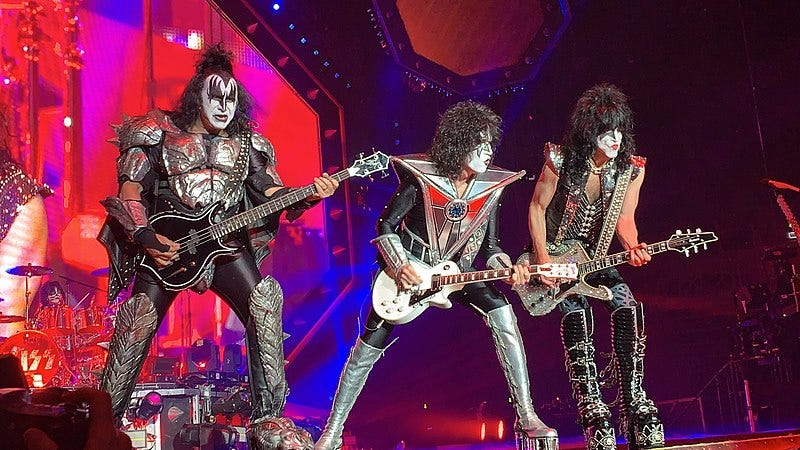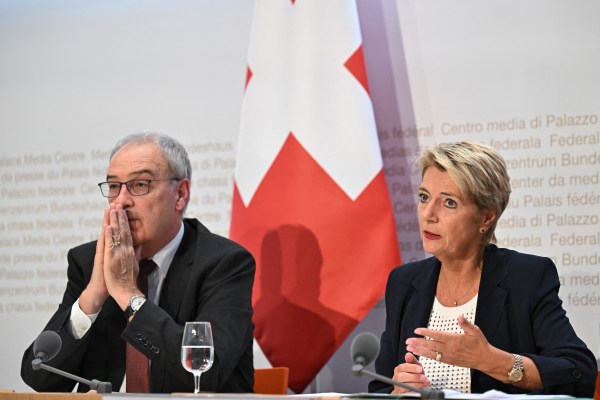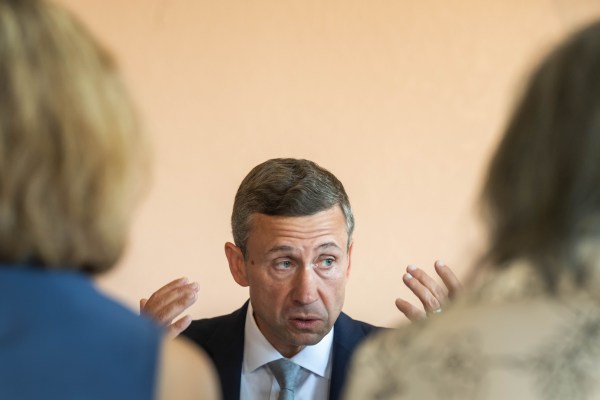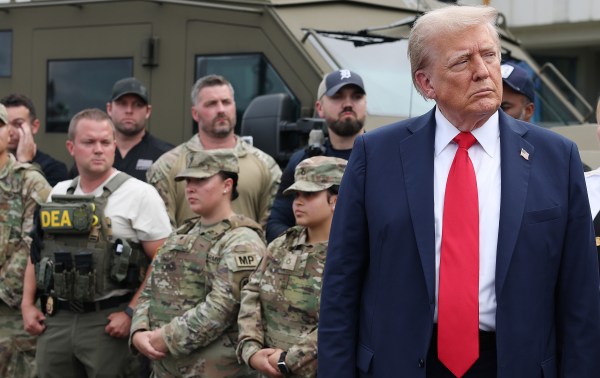“We want more! We want more! We want more!”
“Thank you, Ace! Thank you, Ace! Thank you, Ace!”
Such chants are common throughout Nashville’s Sonesta Airport Hotel on this balmy Memorial Day weekend. Everywhere, there’s a feverish energy. A geodesic dome behind the main building bustles with vendors offering T-shirts, posters, magazines, and other miscellanea at variable prices; guests from across the United States swarm the restaurant, overwhelming its weary staff; lines that stretch across the lobby from the conference hall to the elevators are met with curious glances from receptionists. At night, the ballroom is populated by a roaring crowd, its veneration directed toward a stage adorned with shining spotlights and towering amplifiers.
Gathered together in the Tennessee heat are a unique breed of obsessives, united by a fondness for greasepaint and guitars. They are the Kiss Army: fervid devotees of the garish glam rockers who dominated ‘70s Americana. And they have assembled here to celebrate their shared affection for the self-professed “Hottest Band in the World.”
The event? Creatures Fest, a three-day convention and music festival organized by a wealthy aficionado, Neil Davis. His intention is to create something historic. There have been 10 members of Kiss throughout the band’s near 50-year career, and for the first time, the four living ex-members have been booked to perform at the same event. They are Ace Frehley and Peter Criss—Kiss’ founding guitarist and drummer, respectively—Vinnie Vincent—Frehley’s first replacement who became a recluse after a brief brush with fame— and Bruce Kulick—the band’s fourth lead guitarist and its musical bedrock during the ‘80s and early ‘90s. For the super-fans in attendance, seeing them perform individually is an attraction in itself. Yet Davis has promised that they will share the stage in varying combinations throughout the weekend. His most daring pledge is that the “Holy Trinity” of Frehley, Vincent, and Kulick will play a handful of songs on Saturday night, despite Vincent’s notorious reputation for canceling appearances at the last minute.
Now, Saturday afternoon has arrived, and as the moment approaches I sit picking at a plate of nachos in the hotel bar, vainly attempting to distract myself from the cold I’ve picked up while eavesdropping on nearby conversations. In the voices of those around me, there’s a confidence that Vincent is too unreliable for this to occur at all, never mind successfully. But there’s also a nervous anticipation that it might just be what Davis has promised: an extraordinary, once-in-a-lifetime moment. The weekend has been so enjoyable so far that optimism is difficult to resist.
It began on Thursday. After an early flight, an excessive barbeque lunch, and a few hours of sightseeing, I arrived in the Sonesta lobby around 7 p.m. The decor—prosaic yet reasonably elegant—seemed incongruous when viewed alongside the profusion of band T-shirts on display. (Surprisingly, every shirt I noticed was unique, and nobody wore face paint.) A colossal sign emblazoned with the festival logo provided a backdrop for selfies, and as I watched countless attendees move through the hotel while shouting their excitement, the atmosphere immediately became febrile. Families that had come for a peaceful holiday wandered past with looks of confusion while I made small talk with an exhausted waitress on break from the hectic restaurant. “Are you looking forward to Creature Fest?” she asked me with more than a hint of disdain. When I explained what had drawn the influx of people, she couldn’t help but roll her eyes. “Oh, so it’s like old men rocking out? I’m a nerd but I’m not that kind of nerd.”
I moved to the registration booth to receive my passes. Printed tickets were required for verification, and in a nearby office an elderly fan struggled to access his email on a hotel computer, creatively stringing expletives together under his breath. With my wristband attached, I strolled through the building to examine the eclectic crowd. Though some of the early arrivals were veteran fans—many of them nicotine-dependent, greasy-haired, and bearded—others skewed younger, and children scampered outside in unexpected numbers.
I mingled with various groups and caught snippets of conversations. One fan remarked that he had just been released from prison. Another showed me her tattoos—a portrait of each Kiss member had been branded on her body. In the ‘70s, Kiss appealed to young Americans by granting them an escape from the drudgery of suburbia and the frustrations of adolescence. A similar feeling of carefree liberation rose in the evening air and promised that the weekend would provide a respite from life’s oppressive routines.
Friday morning arrived and brought with it the festival’s official kick-off: a pool party. Through the lobby’s grand windows, I saw fans descending on the pool area while drinks flowed from grinning vendors. On an elevated concrete stage in front of the pool, staff prepared microphones and tested instruments for the first concert of the weekend, a recreation of Kiss’ acoustic 1995 performance on MTV’s Unplugged series by an “all-star” group of rock musicians from various bands, but not the members of Kiss themselves. As I made my way downstairs, I caught sight of a single fan in full costume, dressed as Ace Frehley circa 1976. He told me he was autistic and considered Frehley his greatest inspiration, all the while exuding hope that his hero would make a surprise appearance.
Kiss songs blared from a lofty pair of speakers while a crowd gradually formed before the stage, but only a brave few wore trunks and dared to swim. An overcast sky threatened rain, and as the concert began the encroaching cold seemed to mock our enthusiasm. But soon the sky broke open, bathing the grounds in radiant light, and at once the atmosphere began to uplift. Suddenly, the musicians on stage stood above a sprawling audience that wailed along to every word and heckled affectionately in the quiet lulls between songs. Technical difficulties ranging from flubbed lyrics to muffled guitars provoked a mild amount of anxiety. But when Frehley emerged from a side door to perform his old staple, “2,000 Man,” a deafening cheer erupted from the exuberant crowd and all unease evaporated.
After the performance, I lingered outside while the band members cleared their equipment. Fans tore paper setlists from the stage and posed for pictures with instruments. Behind me, a stout man in a bathing suit, already inebriated, fell over a stone step while attempting to reach the stairs, and a nearby married couple failed to suppress a giggling fit. A boy holding a replica pair of Frehley’s boots sat beneath a poolside tent with his father. They had flown from South America solely to meet their idol, who was scheduled to take the main concert stage in a matter of hours.
As the pool party unfolded, that stage was erected in the hotel ballroom, a space defined by drab carpeting and an equally unromantic beige ceiling. When the doors opened for the evening’s concerts, it seemed as though mere seconds had passed since breakfast, but those around me showed no trace of enervation. At 9 p.m., Frehley arrived to the sound of another tremendous roar, and his set passed by in a flash of radiant lights, ethereal smoke, piercing guitars, and thunderous drums. All had been successful so far.
On Saturday morning, “Expo City,” a marketplace created in the dome beside the hotel, opened its doors to the masses. Hundreds moved through the room, their conversations overlapping in a cacophony as they debated Kiss minutiae. Wide tables of ephemera stood together in rows that formed a monument to unwashed geekdom. Books, bootleg records, and artwork consumed much of the space, but other artifacts like action figures and lunchboxes added to the clutter. One vendor, whose display covered the entire back wall, offered exact replicas of costumes from across Kiss’ career which passing fans flocked to touch. (The studded leather outfits felt shockingly flimsy, while a platform boot seemed to carry the weight of a brick.) Bands performed throughout the day on the opposite side of the room, including Kuarantine, a group fronted by the wrestler Chris Jericho, who pranced about the stage in chainmail while recreating the profane stage patter that Kiss’ frontman, Paul Stanley, adopted in the ‘80s. A familiar story about a visit to a female doctor inspired particular glee among the nostalgia-crazed audience. After the concert, I retreated to the restaurant to prepare for the evening’s entertainment.
It’s nearing 8 p.m. Vinnie Vincent is scheduled to perform within the hour, and a line spanning the length of the entire ground floor has already formed. For decades, Vincent has been Kiss’ great enigma. After revitalizing the band’s songwriting in the early ‘80s and pursuing a brief solo career, he disappeared from public life at the dawn of the 2000s and spent years in total isolation. In 2018, he finally resurfaced at a convention in Atlanta and spoke at length about his troubled personal life. But controversy followed as a series of comeback concerts were announced and then repeatedly canceled. Tonight may be his last chance to prove that he can still play, and the air is equally thick with excitement and apprehension.
I take my place at the back of the line and begin speculating with those in front of me as more fans join behind. Time passes, we stand still, and restlessness creeps in. Last night, we entered the ballroom as soon as the doors were scheduled to open, but now it’s been more than 40 minutes since the advertised start time. Yet just as it seems those who predicted disappointment will be vindicated, the line begins to move. We pass through a security checkpoint into the corridor outside the ballroom, but the doors are still closed, and again we’re forced to wait in a claustrophobic mass. Seconds pass like years, and though many are affable, others are clearly growing agitated. “Something tells me this isn’t the promoter’s fault,” someone beside me observes with a laugh. A screeching guitar seems faintly audible from inside, but the group I’ve been submerged in jokes that this is probably a collective hallucination. Frustration is palpable, and the dour security guards blocking the entrances have nothing to communicate. Eventually, though, nearly two hours after the advertised start time, they stand aside. The doors are thrown open, and any concern for health and safety is discarded as we frantically squeeze through.
Inside, we’re greeted with a distinctly bizarre spectacle. On Vincent’s first tour with Kiss in 1983, the stage was designed to resemble a large tank, complete with a protruding turret that doubled as a drum riser. Out of sheer fanaticism, the event organizers have spent a considerable sum to replicate that stage, only this time, there are no drums in sight. Perched on top of the turret is Vincent, dressed in black with his old face paint clumsily applied, nervously avoiding eye contact with the audience and shredding wildly on a pink guitar while smoke billows around him. His only peer on stage is a security guard who bellows, “No cameras!” and shines a flashlight in the eyes of those who attempt to record the scene. As the room fills, most can only gawk in surprise, and when Vincent’s fingers finish dancing along the fretboard, an enormous cheer rings out, followed by an earnest chant: “Vin-nie! Vin-nie! Vin-nie!”
But then, rather than beginning an actual song, Vincent simply continues shredding. Notes spew from his guitar without a trace of melody, like water from a broken hydrant. Smiles twist into grimaces before the 20-minute onslaught, until a leather-clad bassist emerges from behind the turret. It seems certain that a full band will follow, but instead, all of those present backstage—event staff, stray musicians, and a few fortunate fans—take the stage. The drum track to Kiss’ “I Love it Loud” begins blaring from the speakers, and Vincent overlays it with basic rhythm guitar while the surrounding group attempts to dance. Those around me watch with hopelessly bewildered facial expressions as the song unfolds, their eyes wide at the sight of something the writers of This is Spinal Tap would have thought too ridiculous to include.
When the track finishes, the moment arrives: As promised, Bruce Kulick and Ace Frehley join Vincent on stage. Frehley launches into “Cold Gin,” his first composition for Kiss, but the track to “Deuce” plays instead, and a grizzled fan to my left offers a pertinent question: “Why the f— don’t they just put a real drummer up there?” The quartet restarts and somehow fumbles through both songs, but in the process, Frehley’s guitar becomes disconnected, Vincent simply stops playing, and Kulick, visibly straining to conceal his discomfort, is forced to complete the show himself. History has been made, but in the style of a farce.
In the aftermath, I meander through the hotel lobby, which feels at once like a party and a wake. Fans congregate in groups and struggle to make sense of the madness: Why would the organizers painstakingly recreate the tank set just for that brief, bizarre spectacle? What caused the delay? And why, with such a rich talent pool backstage, did Vincent refuse to employ a live band? For hours we discuss these points. Some cackle loudly, others seem glum, and the phrase “train wreck” is used liberally. But whether we’ve witnessed a tragedy or a comedy, it may never be repeated.
Sunday arrives, and in the marketplace, hysterical laughter is everywhere as fans continue to dissect last night’s catastrophe and deplete the vendors’ stalls. A deep sense of camaraderie has overtaken the venue, as fans have spent the weekend bonding over their mutual love of Kiss and now the shared experience of the surreal disaster we all just witnessed. But thankfully, Kulick is tonight’s headliner, and he brings the weekend to a triumphant conclusion. His band performs without a single mistake as those in the crowd pound their fists vigorously, sing until their throats are raw, and sway shoulder to shoulder in glee. On the right-hand side of the stage, two fans dressed in full costume as Gene Simmons and Paul Stanley are inundated with requests for pictures. “I think we should just shut the door and start the whole weekend over again!” Todd Kerns, Kulick’s vocalist, howls into his microphone to a rapturous response.
At midnight, it’s over. Outside, Ubers destined for the airport arrive in an endless stream while those departing in the morning retreat to their rooms. Friends, new and old, trade goodbyes, and all interactions are underpinned by a tinge of sadness at how time can so swiftly disappear. Despite its occasional disappointments, the event has ultimately delivered what Kiss’ music always provided: an excuse to inhabit a fantasy world where the only rule is to rock and roll all night and party every day.






Please note that we at The Dispatch hold ourselves, our work, and our commenters to a higher standard than other places on the internet. We welcome comments that foster genuine debate or discussion—including comments critical of us or our work—but responses that include ad hominem attacks on fellow Dispatch members or are intended to stoke fear and anger may be moderated.
With your membership, you only have the ability to comment on The Morning Dispatch articles. Consider upgrading to join the conversation everywhere.